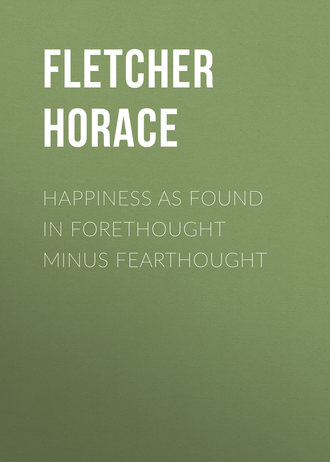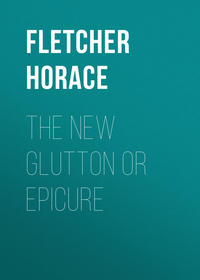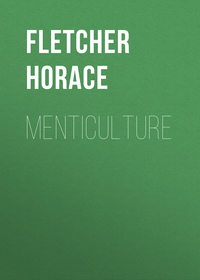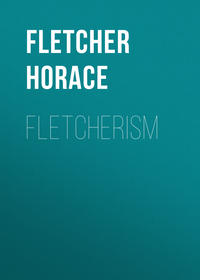 полная версия
полная версияHappiness as Found in Forethought Minus Fearthought
Fearthought is the cause of indecision, suspicion, apprehension, jealousy, envy, indifference, self-degradation and all other forms of weakness which separate the afflicted from the tide of success and happiness, and which condemn them to the whirling and restless eddy of isolation and non-progression.
Fearthought is blasphemy, because it gives the lie to the fixed promises of God, as evidenced by experience.
Fearthought is like carbonic-acid gas pumped into one's atmosphere. It causes mental, moral and spiritual asphyxiation, and sometimes death – death to energy, death to tissue and death to all growth.
Fearthought is a liar, and the father of lies.
Quarantine against Fearthought first.
Fearthought is more contagious than any other disease.
Fearthought is the chief distributer and promoter of other contagious diseases.
Fearthought can be guarded against by anti-toxic means, just as smallpox and diphtheria can be guarded against.
The serum to be used against fearthought is intelligent, persistent right suggestion.
Fearthought can also be quarantined against, the same as other contagious diseases.
Society can quarantine against fearthought by refusing to tolerate it as a necessity of civilized life – by classing it as not-respectable, and by refusing to feed it with sympathy.
Quarantine against fearthought in the individual is an easy matter to any one who will learn that it is only evil and never good.
Fearthought should be kept "without the gates."
Forethought for others is the most intelligent altruism.
Forethought is the natural condition, but can exist only in the absence of fearthought.
Forethought growing out of disagreeable or disastrous experience is a useful and worthy fruit; but fearthought taken from the same experience adds to the evil.
If a child be guarded against fearthought, he will enjoy immunity from it during life – a life twice or thrice prolonged in consequence. Parents should note the responsibility.
The consensus of the experience of parents, of physicians, of biologists, and of everyone who has observed child-life, is that the premises and deductions here given are correct, but as yet there has been no systematic effort made to eliminate fearthought out of the atmosphere of children, as there has been to eliminate weeds, malaria, contagious diseases, and other evils. Society should unite for defense against, and the extermination of, childhood's worst enemy.
Fearthought is the most pregnant cause of disaster and death.
Whoever teaches fearthought to a child, by either legend or example, may be a murderer by so doing.
Whoever permits or nurses fearthought within himself, sows the seed of suicide.
Whoever robs a child of the freedom of mind with which nature prefers to endow it, whether it be through pre-natal suggestion or through suggestion given after birth, is more a thief than one who robs it of its patrimony of goods or lands.
Whoever teaches or permits a child to suffer fearthought may never know the end of the disturbance caused thereby. Lying, stealing, avarice, suicide and murder may lie within the wake of its influence.
If parents have wronged their children unwittingly, they may yet correct the infliction by right example and by right counter-suggestions, lovingly, patiently, persistently and religiously given until the evil has been eradicated.
Fearthought is the seed of Suicide.
Freedom is a Birthright.
Civilized Society insures Freedom.
The author has had much experience within the past few years which teaches that fearthought itself, and tendency to fearthought, are bad habits of the mind, that can be entirely counteracted if so desired, and if the desire be accompanied by reasonable assistance on the part of the afflicted ones.
Fearthought is the last relic of animal suspicion to be located, analyzed and dispelled. When it is entirely killed; then, and only then, will man become free – free to grow, free to appreciate his divine inheritance and free to enjoy it as ordained. As in agriculture and in horticulture, so in menticulture, and its contingent, physiculture, will it be found that deterrents to perfect growth can be eradicated, and that if attention to the germ-eradication of the deterrents is intelligent and persistent, God will surely develop perfect growth and the perfect fruit of happiness.
Freedom is easier than not.
Fearthought is the result of ignorance or perversity.
Fearthought which is perverse is criminal.
Fearing for others is criminal, because it not only depresses and weakens them, but because it robs them of some part of the strength that encouragement and hopeful thought would give them.
Parents who do not wish to poison the natural energy of their children by depression and weakness, should learn the effect of telepathic influence for good or for evil, and thereby know that all of the expressions of fearthought are rank poisons.
Parents hold the key to character.
Whenever parents allow or teach their children to have fearthought, they foster in them the temptation to lie and steal.
Crime lurks in fearthought.
Ignorance is not bliss.
Ignorance can no longer be accepted as an excuse for the toleration of fear.
Thought precedes every emotion and every act of life. It must have no element of fear in it, if it is to lead up and on.
Habit-of-thought asserts itself on all occasions. Habit-of-feeling is the truer description, for the reason that it is the emotional self and not the thought-self that first responds to surprise.
Habit-of-thought or habit-of-feeling can be trained to respond to surprise with "I must not be afraid," as easily as it is permitted to respond with the cowardly dictum, "I am afraid."
If one have the habit-of-fearthought in any form or degree, surprise may cause it to inspire rash action which may end in disaster. More lives are lost through jumping into danger under the impulse of fearthought, than are ever saved by it. Calm forethought is the better friend in a case of peril than quaking fearthought.
I must not be afraid!
Fearthought is a dissembler.
Fearthought is a very dangerous enemy, because it habitually masquerades in the garb of forethought.
Many earnest persons who desire to cultivate only the best thought, believe that fearthought is forethought, and invite and nurse it as such.
The lexicographers even, have failed to separate fearthought from forethought, and hence it does not appear in the dictionaries under its specific descriptive appellation.
Let fear be disguised no longer. It is a child of ignorant or perverse imagination. It is fearthought only. It is always irrational and illogical. It has no element of good nor of protection in it. Separated from forethought, fearthought causes only paralysis and death, and neither energizes nor saves life. It is the devil. It is the result of false premises or impressions, but can be counteracted by logical premises and right impressions.
Fearthought is a masquerader.
The timid are the most impressionable, and can be cured of fearthought by intelligent, persistent, counter-suggestion.
Impressibility is as powerful an aid to good or right suggestion as it is to bad or false suggestion. Differently used, an element of weakness becomes an element of strength. In a matter of mind-accomplishment no one need say "I can't," for mind is what it most earnestly wishes to be.
Limiting weaknesses there are, at present, but these are generally found in asylums. A crusade against fearthought would, within one generation, make asylums unnecessary.
Average intelligence can be cleared of fearthought. A crusade against fearthought would immeasurably raise the average of intelligence.
Let no one deprecate himself or his fellows as to his or their possibilities. The timid may become courageous; the weak may become strong; the sick may become well, and the unhappy may become happy, by the reversal of the attitude of their energy toward life's problems.
Courage is a birthright.
Fearlessness of death insures the strongest love of life.
No one can know what it is to appreciate life at its best until he has ceased to have any suspicion of dread of death.
No one can realize the keenest enjoyment of life until he has grown to feel—appreciate– that this life is an important stage of an evolutionary process, in which the dawning of spiritual possibilities opens up the realm of divine existence to him, and introduces to his consciousness that appreciation of God which gives birth to love, growth and happiness.
When fearthought is entirely eradicated from the mind by the elimination of the basic fear – the fear of death – man begins to feel the responsibility of growing his best, of ripening in natural manner, and of dropping into the lap of Mother Earth only when he has instilled into himself the richest and sweetest juices of an appreciative and altruistic life.
Fear not Death if you would know and love life.
Mother-thought is the strongest of all thought.
Voluntary motherhood is the bravest of all acts common in life.
Whoever teaches a child to be fearless, builds greater than she can ever know, for fearlessness in one inspires courage in many; and as courage inspires strength and causes action, there is no end to what may grow out of the fearless influence of the frailest and physically weakest of women, and any young mother, in the quiet and seclusion of a modest home, can set in motion vibrations of strength and fearlessness that may result in the building of a great city or the invention of some world-emancipating tool of progress.
All great accomplishments can be traced back to mother-influence. Mother-muscle may be wanting, but mother-thought rules the world.
Mother-thought is always brave-thought in one emergency, and therefore can be strong in all emergencies.
Mother-thought rules the world.
Mother-thought blesses life.
All water is pure water.
It is impurities within water that muddy it.
All men are innately good.
It is the presence of false impressions, the result of false suggestions, that makes men selfish and bad.
There is no impurity in water that cannot be removed by some means within the reach of chemistry, and there is likewise no bad suggestion impressed on a sane human mind that cannot be counteracted by some right and good suggestion.
In your judgment of men, judge the sum of their opportunities and the quality of their environing atmosphere, and not the individuals themselves. It will aid you to a more just appreciation of the possible goodness of your neighbors, and greatly help to conserve your own happiness, through the diffusion of the warm blood of charitable impulse.
Mould conditions aright, and men will grow good to fit them.
The perfect man is the harmonious man.
The perfection of anything is dependent upon the perfection of all its parts.
Good society is made up of good individuals; individuals are measured by their qualities of mind and character; and mind and character are pure and good according as their constituent elements are pure and good.
Fearthought is a weak element of mind and its influence on character is blighting.
In chemistry and in mechanics we analyse and test with greatest care the material we use, to learn its value as related to our purpose. If it have any element of weakness we discard it.
Measure, and weigh well, thought about the future; if it partake of fearthought, expel it from the mind, for it is evil; if it be filled with strength, and hope, and confidence, nurse it tenderly, for it is good.
Harmony is strength.
Forethought is strong thought.
Fearthought is weak thought.
Nervousness is frequently discreditable, and, therefore, not-respectable.
Nervousness is the "scapegoat" for much cowardice, ignorance and perversion, sometimes of prenatal, but generally of post-natal, origin. It is not as respectable as scrofula, for the reason that scrofula may have been inherited or contracted by the accident or evil doing of another, and can be corrected only by process of regeneration; while nervousness is an expression or reflection of fearthought which can be corrected by one's own right-thinking.
Whoever is not nervous when he is asleep need not be nervous when he is awake.
Eminent physicians have recently authorized the above assertions relative to nervousness. If it is evil and unnecessary, it is, therefore, not-respectable.
When nervous, seek within the habit-of-thought for a cause.
Attraction rules the universe.
The rivalry between attraction and counter-attraction is friendly.
Evolution is the result of being attracted to increase and to growth, and not the result of being pushed to growth.
All plant life inclines towards the light and the sun.
Plant life that is strong enough to withstand the storms, turns its back in protest to the wind.
Pessimists snarlingly assert that attraction is the pushing of desire for change, but pessimists are diseased themselves, and therefore call things by wrong names, and give the wrong construction to everything.
Appreciation and resultant Love are caused by attraction, and not by fear.
Whatever is attracted forward or upward, will remain in advance or above.
Forethought is eagerly receptive and seeks progress through attraction.
Fearthought pushes to action by its own cowardice, and accomplishes nothing useful.
Altruism is a powerful magnet; good men are "as true as steel."
Consideration is practical altruism.
Consideration for others is evidenced by desiring to do for them what is most desired by them, or, what is best for them. It assumes no superiority.
Consideration is "catching," and the easiest way to accomplish one's own desires, in connection with others, is to suggest consideration by consideration.
No one ever "lost a trick, or missed a meal," by being considerate; and simple, unaffected consideration has often been the means of adding great possessions to its own richness.
"After you," will unravel a crowd quicker than any pushing to be first.
Fearthought, and the selfishness growing out of it, are the origin of all lack of consideration for others; and contact with others, and the every-day amenities of life furnish constant opportunity for attacking one of the strongest expressions of the disease of fearthought by practice of altruistic consideration.
The first requisite of gentility is consideration.
Happy Day!
"Good morrow," "good day," "good morning," and "good evening," were originally intended to have the same significance as our opening salutation, but now they have generally become stale and mean no more than "how are y – " "how d'y" and other perfunctory greetings that are ridiculous when rendered with an inflection that resembles a grunt.
Elsewhere it is related how "happy day" is used in some families to greet the morning.
What humanity is suffering from is a restriction of affections, and an effusion of fears.
People are afraid of being frank and therefore cultivate the sulks, suffer and become ill from the repression.
If you cannot greet the morning and likewise every living thing and every inanimate thing that there is with "Happy Day," you had better take medicine for the trouble, for you are really ill.
Happy Day!
Forethought is Optimism.
All good men are optimists.
The contrastive definitions of "optimism," and "pessimism" and "content," as given by Rev. Dr. Newel Dwight Hillis in an address on optimism, which the author had the pleasure of hearing, are in themselves an epitome of good suggestion relative to the profitable attitude toward the past, the present and the future.
Said Dr. Hillis, "The pessimist cries, 'all is ill, and nothing can be well'; the idle dreamer assumes that 'all is well,' but the optimist declares that 'all has not been ill, and all has not been well – all is not ill, and all is not well – but all can be and therefore shall be well.'"
Appreciation of ever-present blessings – the sun, the birds, the perfume of the flowers, the mist, the constant changes in the aspect of nature, the love of friends, the hurdles that are met and cleared at a bound, and even the obstructions that Providence places in the wrong road, make them all seem to chant in chorus, – "No matter what has been; no matter what is; all can be and shall be well."
Optimism is life.
Fearthought inspires Pessimism.
Pessimism is a false prophet.
It would certainly seem to be in the interest of freedom if the utterances of evil foreboding and pessimistic prophesy were frowned upon, if pessimists were avoided as lepers are avoided, and if their effect on growth and development were to measure the merit or demerit of thoughts or teachings, as well as of actions.
Society's duty toward the individual is wisely to prevent him from doing harm, either to himself or to others. All experience teaches that pessimism is generally lying prophesy. To prohibit false prophesy, that can only injure both the maker and the hearer of it, would seem, then, to be not only the right, but the duty, of society. To prohibit bad suggestion as well as bad action, when action is known to be but materialized or realized suggestion, would seem to be a duty of society.
Pessimism is poison.
"Perfect Love Casteth out Fear."
But:
Perfect Love cannot exist until Fear is first cast out.
Forethought is essential to cultivation and happiness.
But:
Fearthought in forethought prevents cultivation and kills happiness.
Fear is Habit-of-Fearthought only, and is self-imposed, or imported.
It is, therefore:
Unnecessary.
Fearthought, being unnecessary, is a weak, or a cowardly, self-infliction.
It is, therefore:
Not-Respectable.
Fearthought, the arch-enemy of mankind, can be eliminated from the Habit-of-Thought – can be entirely eradicated.
But:
not by repression.
Man, equipped with divine selection, is the only cultivator in Nature. Nature does all growing herself, and assigns all cultivating to Man.
But:
He cultivates only through removing deterrents to growth.
Man's value, as assistant in evolution, consists in his ability to create harmonic conditions favorable to growth through the exercise of divine selection.
But:
He secures perfect harmony only by first harmonizing himself.
Happiness is "the aim and the end of existence."
But:
Happiness can rest only in Harmony, Appreciation, Love and Altruism.
Happiness is "The Greatest Thing in the World."
But: —If sought aright,
It is easier than not!
SUGGESTIONS IN MENTICULTURE
STOP IMPORTING; OR ERADICATION VERSUS REPRESSION
The attitude of Man towards his weaknesses is commonly that of repression. He assumes that fearthought, and fear, and anger, and worry, and all of the evil passions are inherent things that may be repressed but not eradicated; modified but not eliminated; kept under partial control but not gotten rid of; and cut down below the surface, so as not to be exposed to the world, but not rooted out entirely.
By some persons it is even thought to be an accomplishment of great merit to acknowledge strong roots of carnal weakness and to then succeed in hiding any outward expression of them. In others, equally well-meaning, the aggressive and consumptive passions are nursed and exhibited as evidences of unusual sensitiveness and virility appertaining to fineness, goodness and greatness. It is not long since it was the custom of clergymen in some denominations to assume unworthiness for themselves in order to glorify the redeeming power of the Saviour, notwithstanding all of Christ's teachings inculcated that true forgiveness consisted in the simple process of ceasing to have– ceasing to admit, or import. When, in former times, priesthood was degraded to a business – an occupation for a living, or for convenience or power – it was natural that the difficulty of the service rendered the laity by the priests should be exaggerated so as to command the highest respect, the greatest power and the largest compensation. Sin was made to seem powerful and ever-present in order that the service rendered in keeping it in check might seem important and everlasting. Under such circumstances, and especially when the one great unpardonable sin against the church was that of doubting the teachings of these teachers, how almost impossible must it have been for the laity to rise superior to evil, when those whose profession it was to combat it, found it so potent an enemy, and who, thereby, filled the atmosphere of thought with dense clouds of evil suggestion.
It is fortunate for the present generation that such shadows of suggestion do not hopelessly oppress it. There are many churches now where appreciation, and love, and purity, and the delights of unselfishness are offered as the attractions towards religion, and where the teachers in them stand for examples of pure thinking, pure living, and spontaneous altruism, practiced as a result of natural impulses that are both agreeable and profitable, and not to save from hell or to fit for a remote heaven. But the shadow of the old method, that so long hid the Christ-method of true thinking and living, still has an influence in giving strength to evil to afflict the weaker sons of our civilization. This shadow, however, cannot long remain. The light of the present awakening is too strong – too electric and too penetrating – to permit it to remain.
It is even looked upon now as a curiosity – a relic of antiquity – to hear the old fears given expression from the pulpit, but root eradication of them is not yet insisted upon as the first and most important teaching, as it should be. It is a common thing now, also, to hear altruistic teaching and optimistic preaching from the pulpits of all denominations, and to hear from the teachers and preachers the assurance that "it is easier than not and more profitable in every way to be unselfish and not to tolerate evil," the new good suggestion of which, is the inspiring assertion that, "it is easier than not."
It would be a rare thing now to find a religious teacher of intelligence who would not agree with the assertion that, when a person is angry, he cannot be, at the moment, a Christian, for being angry is as unchristian as profanity. The same condemnation applies to worry, which is especially commanded against, and which, in the light of the observed promises of God as expressed by the preponderance of the prevalence of good, is not less than blasphemous in its exhibition of lack of confidence in, and appreciation of, the Giver of All Good.
A most helpful thought in connection with the easy subjugation of the animalesque expressions of fearthought is, that they are not inherent things, and that they are imported whenever suffered. The tendency to import is inherent, and the tendency to entertain evil is the shadow of past error in the race which is called race-habit-of-thought, and it is that which has to be replaced by right-habit-of-thought before one is entirely free, but tendency is easily overcome when its parents are discredited and made not-respectable thereby.
The spiritual awakening of the present era that is reclaiming Christianity from the supernatural, or unnatural, and applying it to everyday affairs, may be called practical or business Christianity. A business man who has an occupation wherein it is possible for him to be altruistic, after reading the theory that is the contention of Menticulture, wrote a commentary in which he said: "On these precepts not only 'hang all of the law and the prophets,' but, also, common business sense and all of the profits."
As an illustration of the difference between eradication (or filtration) and repression (or gradual dilution or reform) I will cite a common example: Suppose a vessel to be filled with muddy water which we wish to make clear, so that it will perfectly reflect the ether above, which we call the sky; the easy and effective method is first to pass the water through a filter and thereafter to protect it from contamination. On the contrary, the difficult, expensive, endless and, therefore ineffective method is to pour unlimited clear water into the vessel, in order to gradually replace the muddy water with the excess of pure water.







